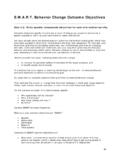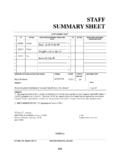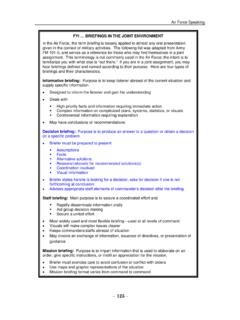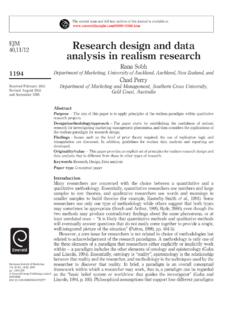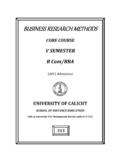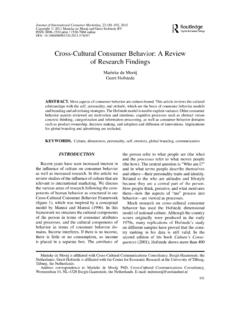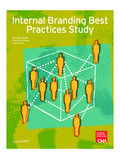Transcription of The History of Marketing Thought
1 The History of Marketing Thought This reading assignment is from Dr. Chuck Hermans PhD work. He is a professor at Missouri State University and granted permission to use it for this course on health Marketing . A key observation to notice throughout this reading assignment is that in the History of business (or commercial) Marketing there has been no reference to health, prevention, wellness or medicine as products or services to motivate people to buy or to sell or market to people. An important concept to note however, from the article is that marketers evolved to applying theories of behavior, the same as health educator s use. Among these are concepts borrowed from established disciplines, such as psychology and sociology and suggesting that Marketing is a social science. Please note that the bold text are from the original text from Dr. Hermans. The article begins now.
2 Bartels, Robert (1976) The History of Marketing Thought , 2nd edition, Highlights selected by Dr. Hermans are from chapters 1,2,3,4,9,10,11,12,13,and 14. Accessed on Sep 18, 2009. Available at Chapter 1: The Meaning of Marketing The establishment of a market economy wrought marked changes in the social and economic structure. A new attitude toward business revolutionized the economy of the country and that revolutionary element was identified by the term Marketing . Historical accounts of trade lead one to conclude that Marketing has always existed. Was the original use of the term Marketing merely an application of a new name to an old practice? One theory is that language is an invention of man, an adornment. The other explanation of the origin of language is that it is inseparable from reason. Accordingly, man s language has developed as his thoughts have developed.
3 By Marketing was first meant that combination of factors which had to be taken into consideration prior to the undertaking of cer6tain selling or promotional activities. The essence of Marketing was the combination of factors. Blindness to and ignorance of that combination of factors is the reason for the absence of terms equivalent to Marketing in other languages. Marketing must be regarded not merely as a business practice, but as a social institution. Marketing is essentially a means of meeting and satisfying certain needs of people. It is a highly developed and refined system of Thought and practice characteristic of a period in the development of market economy. A latent presumption in the practice of Marketing has been that Marketing gives to society more than society gives to it. The fact is that Marketing is but one of several means of accomplishing a social objective.
4 Polyani explains that this objective is accomplished by societies in different ways: reciprocity redistribution economy trade, and the market. Reciprocity is a social system wherein material needs are met through exchange carried on between individuals and groups in the form of gift-giving. Redistribution is a social system involving the assembling of goods at a point from which they are redistributed by a duly constituted authority. Householding, or oecomomia is a social system accomplishing what Marketing does in our society. It involves production for use, not for exchange; Self-sufficiency of trade. Trade is a form of exchange which may be carried on in the absence of markets. It involved prices, in the form of equivalencies, 1. determined by treaty or administrative decision and not by behavior in a market place. The market is the fifth type of social system supplying society's material needs.
5 Originally, the market was a local institution. It was entirely separate from the trade carried on outside the country. The market supplied the common people with daily provisions. From the start, the paramount importance of consumption has been fundamental to Marketing Thought . Moreover, throughout the History of Marketing during this century, and the development of Marketing Thought , interest not only in consumption but in consumers has continually increased. According to economic determinism, there are explanations of the evolution of social and economic order: 1. The biological, 2. The technological 3. The astrological Do men make the times in which such an event occurs, or have the times made the men. Is Marketing a fundamental phenomenon, or a passing one, in the sum of human knowledge? Chapter 2: Earlier Theories Relevant to Marketing Thought The development of Marketing Thought began early in the twentieth century with the conception of Marketing .
6 Early students of Marketing were actually educated as economists. Although they brought forth divergent theories, students of Marketing evolved a body of Thought that by its nature, scope and application, set them apart from the usual economists. THE MARKET. By 1900, it was being found that demand consisted of more than simple purchasing power. It reflected desire as well as ability to purchase, and new experiences with advertising and salesmanship were proving that desire could be increased and molded by factors other than the mere existence of supply. Another concept of the market concerned its capacity to adjust itself automatically to a harmonious equilibrium. It had long been held that competitive forces would normally, in the long run, dissipate tendencies of dis-equilibrium, but as competition diminished in some industries and trades, the assumptions found in traditional economic theory became increasingly invalid.
7 A third idea was that cost was the principal determinant of price, at least in the long run. Concepts of the elasticity of demand were still another influence upon the thinking of early students of Marketing . Alfred Marshall s concept of elasticity of demand has long been used by Marketing writers as a theoretical basis for selling, advertising and the promotional work of Marketing in general. THE MEANING OF VALUE. Value theory was another area of economic Thought relevant to early studies of Marketing . Economists leaned heavily upon input factors, determining their relative quantities and prices. Adam Smith held also, against most commonly held beliefs, that distributive activities contributed to value, but only indirectly. They extended the market, thereby making opportunities for increased production and for greater specialization of labor in production.
8 Economists also distinguished in their value theories value- in-use and value-in-exchange. PRODUCTION. In the eighteenth century, productivity was held by the physicocrats to be the production of a surplus over costs. Concepts of production included: diminishing returns 2. marginal productivity opportunity costs, and the representative firm However, in 1900, there was no clear concept of the justification of Marketing as a productive activity or as a contribution to economic production. On the contrary, the popular impression was that the middleman added cost instead of value. Adam Smith conceived man as the economic man bent upon a constant effort to better his condition. Thus there was a natural basis for competition, and according to natural motivations they would effect perfect competition. Ricardo foresaw the uncertainties of an expanding economy.
9 He viewed a growing disparity of interests in the rising factory system. Alfred Marshall perceived basic co- operation among all parties through the system of markets. His viewpoint, insofar as he emphasized the short run, tended to coincide with the interests of businessmen. THE CONSUMER. Not until the latter part of the nineteenth century, with the writings of the Austrians did real consideration of the consumer make its way into economic theory. ENLARGEMENT OF THE MARKET. The classical economist has assumed markets to be local wherein demanders and suppliers knew of each others presence and this knowledge resulted in perfect competition. With the Industrial Revolution, new importance was attached to information, promotion, and the quest for satisfactory products. Extended markets gave the opportunity for production on a scale larger than had ever before been undertaken.
10 The rapid transition from an agricultural economy to an industrial economy at the end of the century poured into the market such quantities of products as to warrant the conclusion that a buyers market was replacing a sellers market. It had long been a presumption of economic theorists that production was basic that the value created by production constituted the extent of demand in the market, but the American market was anything but static. Chapter 3: Beginnings of Marketing Thought . Early courses at the Ohio state University are cited. 1905 Spring Distribution of Products. 1909-1910 Commercial Credit. 1916-1917 Salesmanship was added. 1921 The curriculum consisted of the following courses: Business communications Marketing Marketing Problems Wholesaling Retailing Credits and collections Salesmanship Advertising Advertising Practice Exporting and Importing Research in Marketing .
